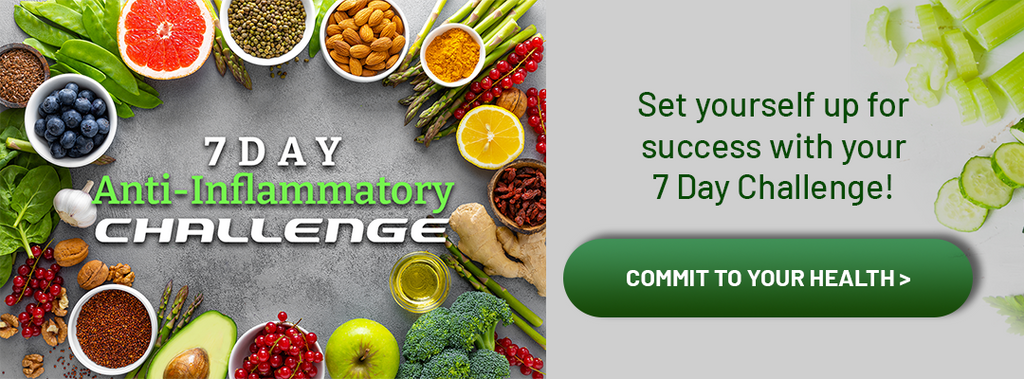Inflammation
In most cases, inflammation aids the body's ability to combat sickness and defend itself from injury. It is usually a vital element of the healing process.
However, some people have a medical condition that causes their immune system to malfunction. This dysfunction can result in chronic or recurring low-level inflammation.
Chronic inflammation is associated with a variety of disorders, including autoimmune diseases, IBD, psoriasis, rheumatoid arthritis, and many more. There is an overflowing of studies and evidence that food choices may aid with symptom management.
Anti-Inflammation Diet
An anti-inflammatory diet emphasizes fruits and vegetables, omega-3 fatty acid-rich meals, whole grains, lean protein, healthy fats, and spices. It discourages or restricts the intake of processed foods, red meats, and alcoholic beverages.
Some foods include chemicals that might cause or exacerbate inflammation. Foods fried in repeatedly heated cooking oil are examples. Sugary or processed meals may cause this, but fresh, natural foods are less likely to do so.
Fresh fruits and vegetables are the foundation of an anti-inflammatory diet. Many plant-based diets are high in antioxidants. Some meals, on the other hand, can cause the creation of free radicals.
Dietary antioxidants are substances found in food that aid in the removal of free radicals from the body. Free radicals are natural results of some human body activities, such as metabolism.
External influences, such as stress and smoking, might, on the other hand, increase the number of free radicals in the body.

Food in Anti-Inflammatory Diets
Fruits
Fruit is nature’s candy. Whereas refined sugar is inflammatory and should be avoided on the anti-inflammatory diet, fruit is anti-inflammatory. It helps provide much-needed energy by giving a boost of natural sugar—and you don’t get the sugar crash of a refined sugar product because fruit contains fiber, which slows down the metabolic process and stabilizes blood sugar.
Fresh fruit, including grapefruit, grapes, blueberries, bananas, apples, mangoes, peaches, tomatoes, and pomegranates.
Berries, whether they’re blueberries, strawberries, raspberries or blackberries all contain antioxidants known as anthocyanins. In fact, it’s the presence of anthocyanins that give berries their vibrant red, blue and purple color.
While all fruits are generally high in antioxidants, berries are superstars with chemical compounds that are great at fighting inflammation, cancer and cardiovascular disease. But here’s the cool part. Not only do berries reduce existing inflammation, but they train our cells to respond better to any episodes of future inflammation. And that’s why it’s important to eat them regularly.
Vegetables

Veggies provide nutrients that are vital to fighting inflammation and maintaining proper body function. Packed with vitamins and minerals, veggies are also an excellent source of fiber.
Cabbage, cauliflower, broccoli, Brussels sprouts, kale, arugula, collard greens, and even wasabi are just a few of the varieties in a group of plants called cruciferous vegetables. These veggies are recognizable for their pungent odor and sometimes bitter flavor and are often touted for their anti-cancer properties. These nutrient-rich veggies contain carotenoids, a type of antioxidant, vitamin C, E, K, folate, minerals, and fiber.
Nuts
Vitamin E (in nuts and seeds) are antioxidants that deactivate free radicals, which are inflammatory molecules that drift into the body from pollution, cigarette smoke, sun radiation, poor diet or are created in the course of normal body metabolism.
Nuts are a rich source of omega-3 fatty acids, particularly alpha-linolenic acid, which is known for its anti-inflammatory properties. They have also been found to lower bad cholesterol while improving metabolism and heart function.
Packed with potassium, iron, vitamin E and fiber, nits are a power-packed snack. They’re also a good source of lutein, a carotenoid helpful for eye health.
Spices
Often overlooked as a source of nutrition, herbs and spices provide excellent anti-inflammatory properties. In addition to eating a wide variety of veggies and fruits. It is also important to incorporate herbs and spices such as turmeric, garlic, ginger, and cinnamon to help decrease inflammation.
-
Turmeric is a major source of curcumin, a micro-nutrient that has long been known for its antioxidant and anti-inflammatory properties. When adding turmeric to recipes, also add a pinch of black pepper to boost absorption of curcumin.
-
Ginger is a root that can reduce inflammation and pain, making it extremely helpful to those working to reduce chronic inflammation. Studies have also found that consuming ginger helps alleviate the nausea and vomiting that many patients experience during chemotherapy treatments for cancer.
-
Cinnamon is a spice that has been commonly used since 2800 BC. It is being studied for its potential in cancer therapy and has been shown to have anti-oxidant and anti-inflammatory properties.
-
Garlic isn’t just a delicious way to add depth of flavor to your dishes, it’s a rich source of selenium with sulfur-containing compounds that are being studied for their possible effect on carcinogens.
Whole Grains
Gluten-free whole grains, such as quinoa, buckwheat, brown rice, millet, and amaranth, are rich in fiber and plant-based protein and boast a high amount of antioxidants that can be beneficial in reducing the risk of disease by blocking inflammation. Try buckwheat and quinoa in this chia, quinoa, and buckwheat bread.
Fatty Fish

Protein is vital to the formation, maintenance, and repair of body tissues. Ensuring that you get an adequate amount of protein in your daily diet is especially important as we age in order to maintain muscle mass.
In addition to being an excellent source of lean protein, fatty fish is also high in omega-3 fatty acids, which are essential to lowering inflammation. Fatty seafood like salmon, trout, albacore tuna, Atlantic herring, Atlantic mackerel, anchovies, sardines, and even mussels, provide an excellent dietary source of omega-threes and lean protein.
Salmon, krill, and tuna are some of the fatty fish that help control inflammation. This is due to the presence of Omega-3 Acids. Arguably, the best source of Omega-3 comes from krill.
Omega 3’s are also critical for brain health and interestingly enough, those who consume fatty fish regularly are less likely to be depressed or anxious. In short, omega-3’s are one of the most well-studied nutrients and the results show time and again the massive anti-inflammatory effects they have on the body.
Inflammatory Foods
Try to avoid or limit these foods as much as possible:
-
refined carbohydrates, such as white bread and pastries
-
French fries and other fried foods
-
soda and other sugar-sweetened beverages
-
red meat (burgers, steaks) and processed meat (hot dogs, sausage) margarine, shortening, and lard
Starting Your Anti-Inflammatory Journey
We’ve all heard the saying “failing to plan is planning to fail”. Meal planning is one of the best tools to help you make healthier eating choices, save money and reduce stress in your life.
Living a healthy lifestyle requires being a little more intentional about your choices, and that’s exactly what meal planning can help you do. The process doesn’t have to be super overwhelming or time-consuming like you might think. It does require more time upfront, but trust me, you’ll thank yourself later!
Do you want to know what the largest benefit of meal planning is in most people’s life? It’s not being bothered by the persistent late-afternoon tension of determining what to eat for dinner. It may sound ridiculous, especially when compared to the health, financial, and food waste benefits, but choice fatigue is real. And for many, it's something that adds to my day's stress and anxiety, which I don't need any more of.
Meal planning, on the other hand, aids in the alleviation of that fatigue.
So when you’re not particularly motivated on Sunday to take 30 minutes to meal plan before you shop, stop to think about how much easier afternoons are when you already have ingredients stocked with a plan on how to use them up. It also keeps you from having to repeatedly answer the "what's for dinner?" question.
To sum it up, save yourself a lot of stress, time, and money by adapting a meal plan to your weekly routine. The results will surprise you.

Having the Perfect Starting Point
A lot of people are intimidated by the process of anti-inflammatory lifestyle and simply don’t know where to start. To provide some quick, simple guide to help you start your journey, it’s recommended to start off with a 7-day guide or challenge. Our go-to is Anti-Inflammatory Diet For Beginners Challenge.
This guide contains all the information you need to start your anti-inflammatory journey without it becoming overwhelming.
With so much misinformation out there on what we should be eating, it's refreshing to see such a well-written and researched 7-day guide for a balanced, anti-inflammatory diet. It's made by someone who understands that life is busy and helps her readers figure out realistic solutions to maintaining a healthy diet. The daily challenges are delicious, quick, and easy, and the instructions make it a no-brainer.
How to get started
☑ Easy to Follow Daily Challenges
☑ Commit to a Pain-Free Life For FREE
☑ Everything You Need To Know To Get Started
The anti-inflammatory diet entails eating foods that have been proved to combat inflammation while also avoiding items that have been shown to contribute to it. Get the guide and challenge to start and commit to your new lifestyle with the Anti-Inflammatory Diet For Beginners Challenge today!




